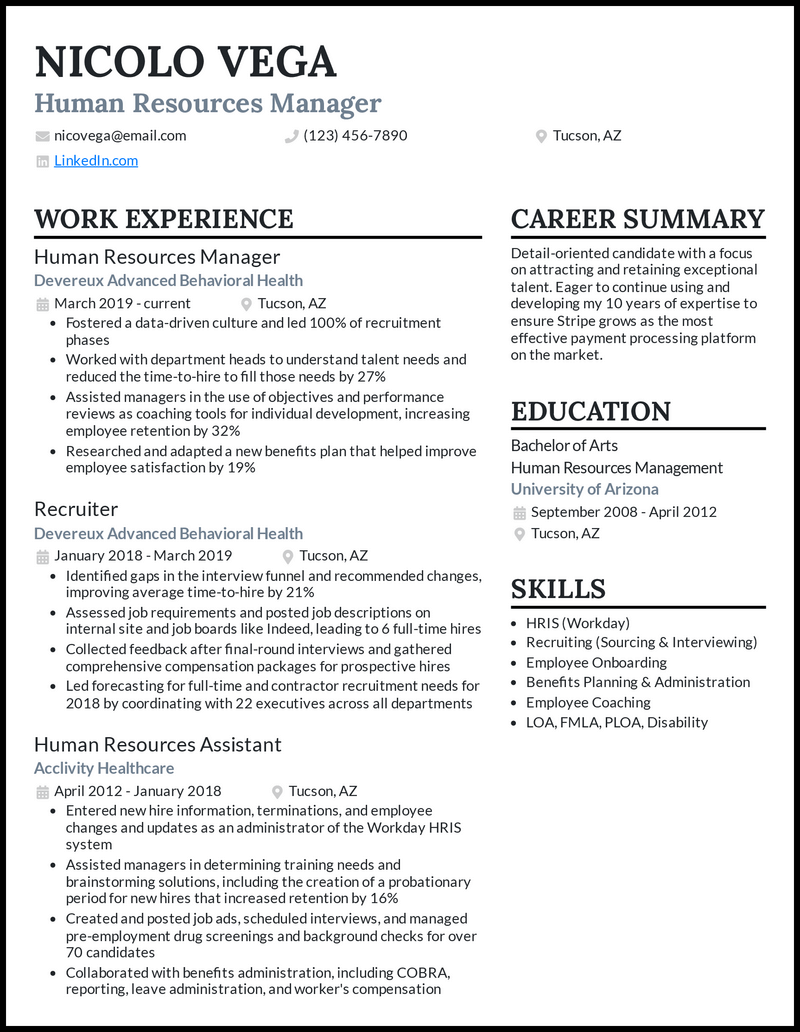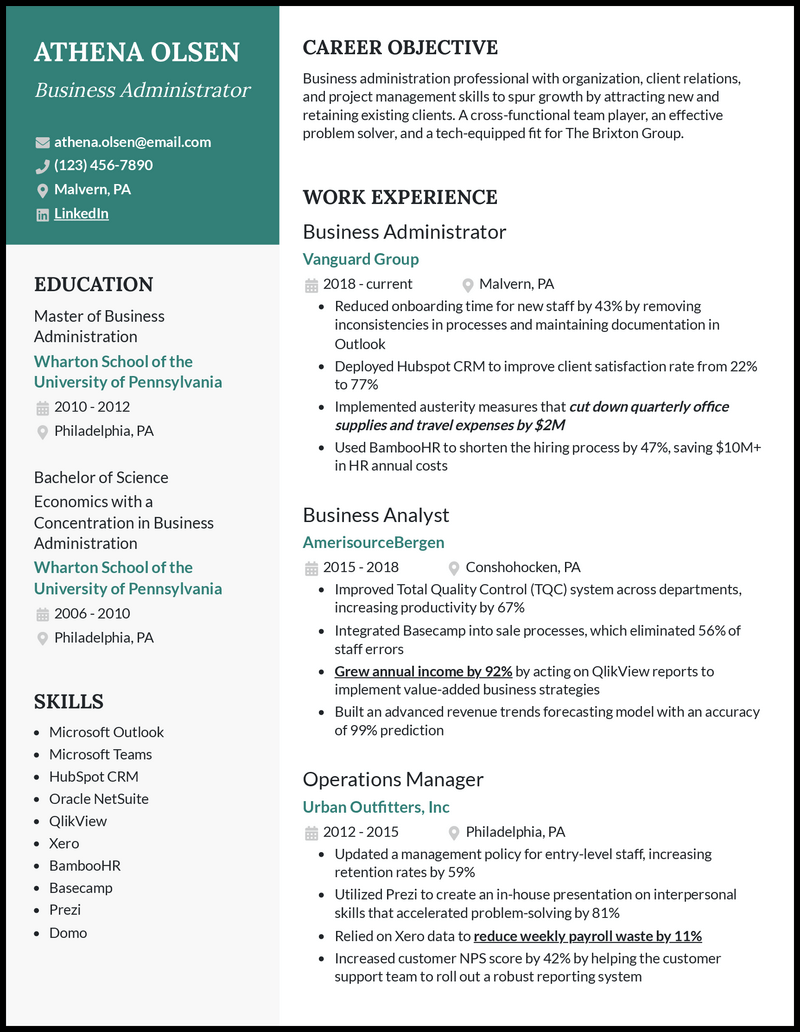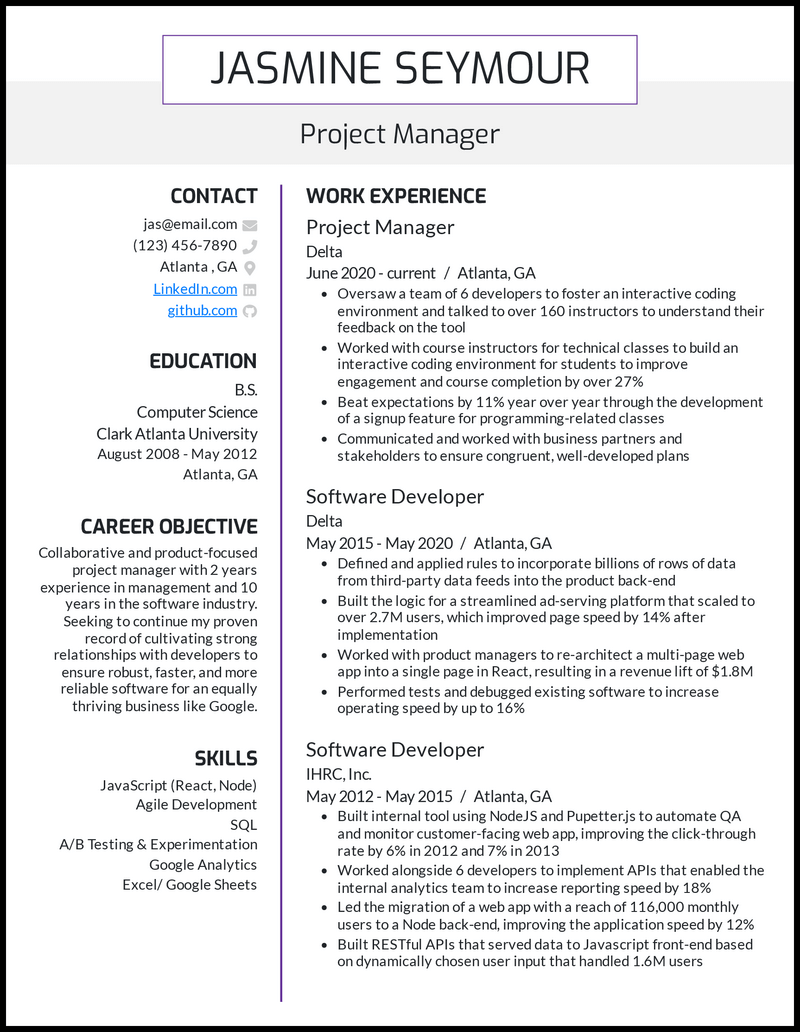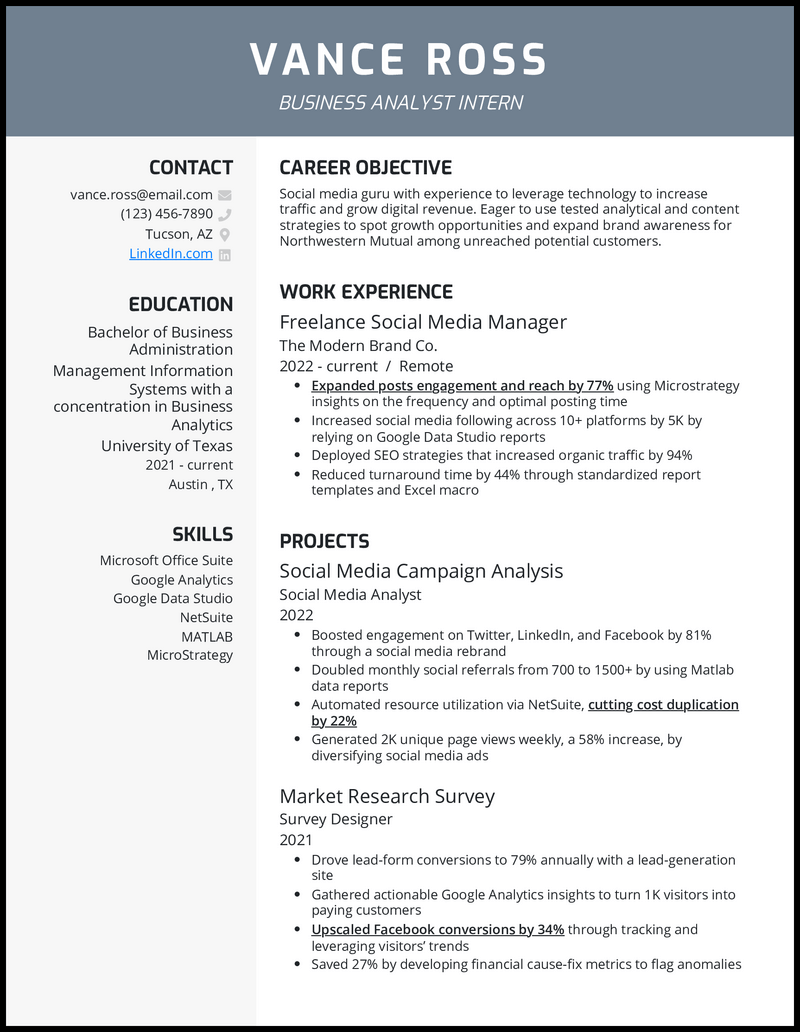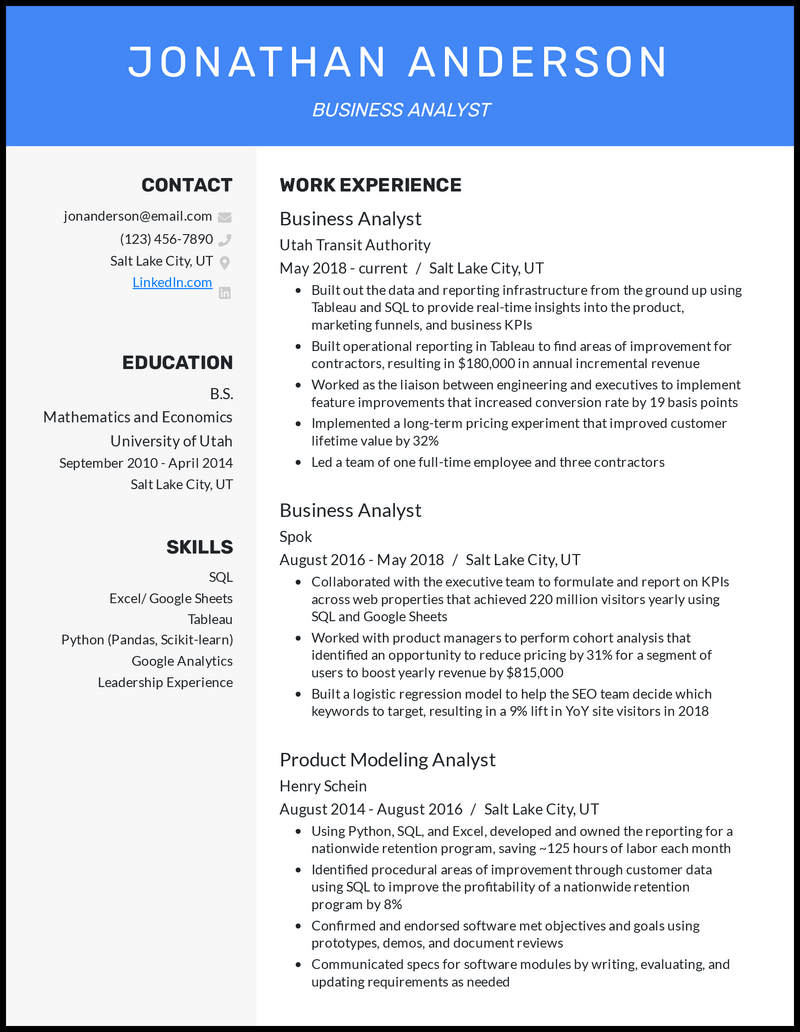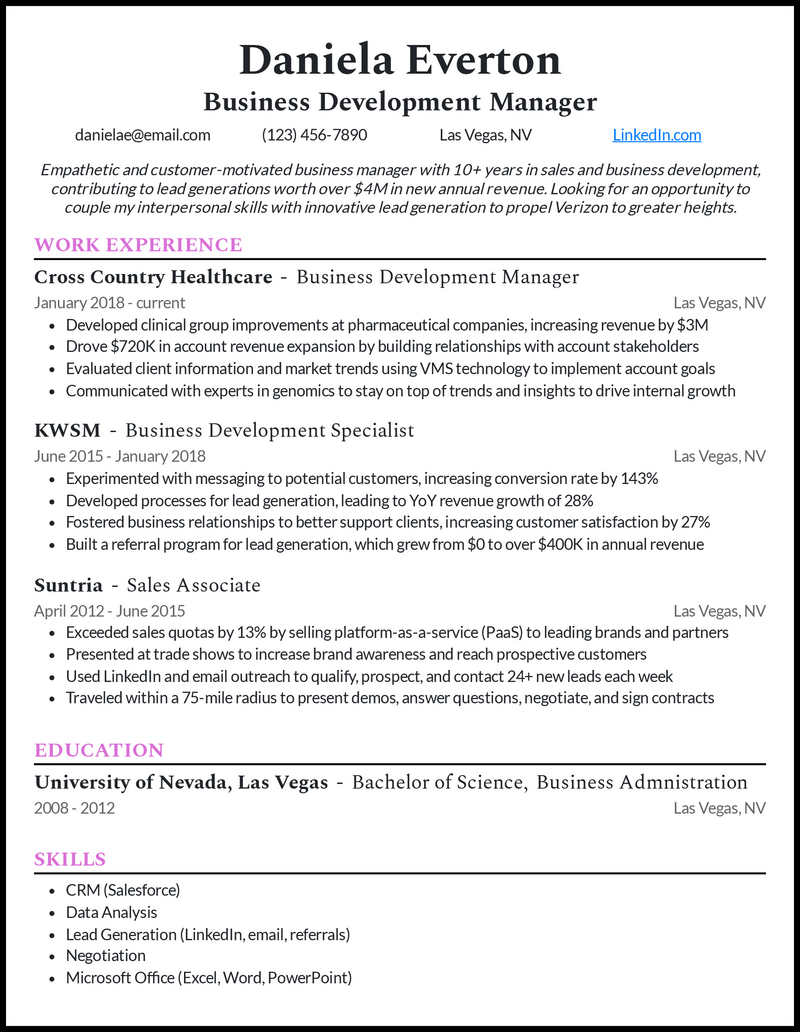Some college degrees provide limited options, whereas pursuing a business degree opens endless doors. From overseeing the operations of a business to recruiting top talent, business occupations can be highly rewarding.
Writing the perfect resume and tinkering with a cover letter maker may seem like the least fun way to spend your time, but like your career choice, if you invest in some upfront work, your resume will work hard for you, and the rewards can be limitless.
We’ve done the heavy lifting, so you can spend more time staying on top of the job search.
Take advantage of our 12 business resume examples and our proven writing tips that will set you up for success. Your resume, we’re sure, will stand apart from the competition, ushering you into your dream job in 2026.
Why this resume works
- Your business resume can benefit from a resume summary if you’ve been in your industry for at least 10 years. While not required, it can showcase your work experience and any specializations you’ve acquired along the length of your career.
- While you’re job hunting, verify that you’re qualified for the role as some positions require a master’s degree. An MBA will really help you stand out among other applicants on your business resume.
- The whole point of managing operations is so that processes are streamlined, employees and customers are satisfied, and revenue goals are met.
- We suggest you show how you met those goals using numbers and statistics, as they’re easy to read and speak volumes quickly.
Why this resume works
- It’s important that your HR business partner resume takes up a full page, no more and no less. While it can be frustrating to take out or add sentences, try adjusting the format first.
- Many times, adjusting the spacing, margin size, or even rearranging the sections can do just the trick.
- HR is all about investing in people, starting with the recruitment phase and seeing that those individuals are properly onboarded. With that said, if your job is about the hiring process, it’s imperative that you’ve made your own AI resume stellar and top-notch!
- Accomplish this with a resume career summary if you boast at least 10 years in your field. It’ll set you apart from the rookies! You can leverage your summary to remind the employer that you want this position and are aiming to contribute to the rise of the company with any noteworthy specializations you have under your belt.
- A final formatting tip—prominently display your contact information close to your name, so a busy employer can readily and easily contact you; don’t give them a reason to trash your resume.
Why this resume works
- Merging your technical prowess with relevant hard and soft skills on your business administration resume shows an overview of your abilities to a potential employer. Mention specific technical proficiencies and how you have used them to add business value.
- Display how you helped cut costs, increased productivity, automated processes for optimal performance, etc.
See more business administration resumes >
Why this resume works
- Project managers are doers; they’re professionals with a track record of delivering for their organizations. Nothing emphasizes this more on your resume than starting each work experience bullet point with an active verb.
- Avoid personal pronouns, adjectives, or non-active verbs. Instead, start with strong verbs, such as “defined” and “beat.”
- Make your way over to our free resume checking tool for more on using active verbs, getting your grammar just right, and ensuring your resume’s spit-spot.
- Another way to show your professional chops is to include a resume objective.
- While optional, a well-written, concise couple of sentences highlighting your best self, coupled with a few impressive metrics, can be a slam dunk for an interview.
- Your business management resume may include a job or two where you’ve carried a different title, such as a software developer; just avoid the temptation to repeat your job duties from one position to the next. Keep each bullet point’s content fresh and varied.
See more business manager resumes >
Why this resume works
- Leverage your lack of years of experience by bringing to the fore your achievements in exceeding targets. Even as an intern with freelance experience, you can get the job you want by focusing on what you can do.
- You already have a track record in increasing traffic, boosting brand visibility, and using analytics to grow brands. Leverage past success to propel your potential in your business student resume.
Why this resume works
- You couldn’t be more confident in your business analyst chops. Now, here comes the moment to unleash that inner master in you and show the competition who’s the boss. And one secret weapon to wield here? Reverse chronological order, right in the work history of your business major resume.
- Begin by spilling the beans on your most recent senior role (cue business analyst in Victoria’s masterpiece), then proceed back in time, filling in the hiring managers on your junior roles (cue project coordinator and research assistant). One thing, though: let each rung up your career ladder reflect escalating challenges and increasingly impactful outcomes.
Why this resume works
- Aaah, those times when whipping up a job-winning application document feels like nailing jelly to a wall. It’s not impossible, though. By tailoring your business continuity manager resume to mirror the language of the job descriptions, you’re leaps and bounds ahead in your journey to bag that open job.
- Speaking of the specifics, show that you meet the qualifications in the job ad by sprinkling key keywords and phrases throughout your work history. Let’s say the prospective employer is keen on minimizing downtime during a crisis. Now, won’t a statement like “…reducing downtime by 62 hours per year and protecting over $7M in assets” scream your undeniable value? You bet it does.
Why this resume works
- Isn’t business banking not all about sales and customer service? And you bet a huge chunk of the pros in this sector care about aesthetics, too—after all, “When you look good, you feel good.” In the same spirit, choose a visually appealing format for your business banker resume.
- You see that two-column resume layout populated with bullet points, each not spilling over a line? It certainly fits the bill here. About hitting it out of the park, blend punchy bullet points, a legible font (think Times New Roman, Garamond, Arial, and Cambria), and plenty of white space—if nothing else, this combo is great for contrast and balance. And how about making the header stand out with a brighter hue like orange?
Why this resume works
- Don’t gloss over the resume skills section in your experienced business analyst resume. While it may be difficult to narrow down the key skills you have to offer, it’s important to stick with a short, concise list—something an employer can easily glance at to get a read on you.
- It’s a good idea to include abilities that are mentioned in the business job description of the position you’re applying for (if you’re honestly skilled in those areas). Don’t fib, but don’t sell yourself short either!
- Speaking of skills, try to highlight them in your job description bullet points.
- For example, if you’re skilled with SQL, try writing about the impact you made using SQL in a previous position.
See more experienced business analyst resumes >
Why this resume works
- Hmm, it’s that era where tech is virtually everything. And you know what that means when you’re pounding the pavement, looking for your next big opportunity? Flaunting your real-world application of industry-specific software in your business executive resume is one helluva trick to sweep the hiring manager off their feet and secure a job interview with your dream company.
- No doubt, that brief skill section giving tribute to your technical proficiency (we’re talking Zoho CRM, Looker, Jira, NetSuite, and Slack) could have a recruiter grinning from ear to ear. Show them you’re not bluffing by painting your work history red with instances when you drove impressive results out of those software programs.
Why this resume works
- We get it—Marketing is one of the strong suits of the expert business development associate you are, and the desire to kill it at selling your value proposition can sometimes be uncontrollable. However, let that not compel you to oversell yourself (read, throw in personal deets) in your business marketing resume.
- You see those extra like marital status, age, birthday, political and religious affiliations, sexual orientation, captivating pic of yours, and salary history? They’ll likely have the hiring manager give your piece the stink eye. In lieu, zero in on relevant info that shines your competence in the best light (think certifications, work experiences, skills, etc.)
Why this resume works
- Your experienced business development manager resume will work best for you if you organize your experience in reverse-chronological order.
- Reverse-chronological formatting displays your most recent or current position at the top, which will likely be most similar to the position you’re seeking.
- This format also shows the evolution of your career history naturally. Your latter work history may detail more basic duties and less responsibility, and you’ll want the job you’ve listed first to clearly showcase your advanced expertise.
- In the business world, companies are seeking individuals who are consistent in producing results. While you should directly state your impact in your work experience bullet points, you can indirectly speak to your consistency and reliability through your resume template and format.
- Choose a template that’s both professional and eye-catching.
- Be consistent with your resume formatting. Headings, font, and even punctuation (or lack thereof) should be consistent.
Related resume guides
How to Write a Business Resume

Summary
Craft a compelling business resume that showcases achievements, aligns with job roles, and positions you as the standout candidate in a competitive market.
To get a job in the competitive business space, you need a resume that defines your profession, highlights your achievements, and presents your qualifications concisely and clearly.
Ready to make a move and build your dream career? Let’s explore writing a job-winning business resume.

Choose a resume template appropriate for the business role
Choose a professional resume template that compliments the company’s tone. A business degree opens the door to a myriad of jobs, which range from casual to formal roles.
As a business development manager in the healthcare industry, you might choose a more traditional resume template. On the other hand, if you plan to use your business degree to be a project manager in the travel industry, a creative resume template could work well.

Include the specific business title beneath your name
Within your resume’s contact header, add the business title you desire beneath your name. Get this information directly from the job description.
For instance, a business development specialist might also be called a business development associate or business development representative. Adding this professional touch is one way to show the company you care about getting the details right.

Highlight Your Business Education
If you have a master’s degree in business, list that first. Follow that with your bachelor’s. If you’re freshly graduated, consider adding relevant coursework, such as Principles of Operations Management or Business Finance, beneath your most recent education as well as your GPA if it’s above a 3.5 and any academic awards that are relevant to your degree.
Example
Bachelor of Business Administration (BBA)
University of Michigan
Ann Arbor, MI
GPA: 3.8/4.0 | Dean’s List (6 semesters)
2019-2023
Pro tip: If you’re a recent graduate or entry-level candidate, put your education section toward the top of your resume. If you are an experienced professional, keep it concise and below your work history.

Tell your story, not your business responsibilities
Ask yourself how your work tangibly impacted a company or further developed its operations and processes.
Did you identify gaps in reporting, which led you to oversee the development of more robust documentation? Did you experiment with pricing to improve customer lifetime value? Did you increase annual revenue through a referral program you created?
Your resume’s job description bullet points are a chance to share quantifiable business accomplishments rather than daily responsibilities. And your business cover letter is the perfect place to dive into the details of how you made those accomplishments happen.
Example bullet points for a business resume:
- Led a cross-functional team of 5 to launch a new B2B sales strategy, increasing quarterly revenue by 27% within six months.
- Reduced operational costs by 17% by renegotiating vendor contracts and streamlining internal procurement processes.
- Presented financial reports and forecasts that informed executive decision-making, directly contributing to a $500K investment round.
Each bullet point should tell a mini success story—what you did, how you did it, and the impact it delivered.

Add relevant business skills to your resume
Your business background means you could be skilled in communication, CRM, negotiation, employee onboarding, or even technical abilities like SQL, Python, or data analysis. It depends on the direction you’ve gone and the company’s job description that’s caught your attention.
In a new column, jot down the skills mentioned in the job listing. Which ones are the same? Those are the business skills to include in your skills section to showcase your career readiness.
Examples:
- Strategic Planning
- Data Analysis & Business Intelligence
- Project Management
- Financial Forecasting
- Operations Optimization
- Leadership & Team Management
- Customer Relationship Management (CRM)
- Marketing Strategy
- Budgeting & Cost Control
- Negotiation & Conflict Resolution
- Change Management
- Communication & Presentation Skills
In your work experience section, attach these skills to real examples as much as possible. It’s not enough to list the skills—prove them with results.
Land your next job with our AI-powered, user-friendly tool.
Gut the guesswork in your job hunt. Upload your existing resume to check your score and make improvements. Build a resume with one of our eye-catching, recruiter-friendly templates.
• Work in real-time with immediate feedback and tips from our AI-powered experience.
• Leverage thousands of pre-written, job-specific bullet points.
• Edit your resume in-line like a Google Doc or let us walk you through each section at a time.
• Enjoy peace of mind with our money-back guarantee and 5-star customer support.
Business Resume FAQs

A good business resume should present your qualifications, skills, and accomplishments to a potential employer in a concise and compelling way. It should have headings to make it easy to find important information and for ATS to scan and pass it easily.
Another crucial component that would make your resume stand out is the effective use of bullet points. Here, you use active words and skills to paint a picture of an achiever who will hit the ground running once hired for the new role. As you do this, ensure there’s no fluff in your descriptions because you don’t want to turn off a hiring manager when they begin reviewing your application.
It’s your communication channel to show why you deserve the job by allowing you to speak directly to a recruiter and walk them through your career, highlighting achievements and skills. By aligning yourself to the role, you’re ensuring that your potential is visible and that you have a proven record of success from your past.
Reverse chronological format. This order puts your most recent role at the top, going back to the older ones. A recruiter can see your career progression while taking on more responsibilities and delivering success in every position you’ve served. Besides, this format makes it easy for ATS to screen your document and pass it over to a real human recruiting manager to decide.
Overall, choose a design that clearly defines each section and emphasizes your strengths in a clear and professional manner.




![12 Business Resume Examples [& Templates]](https://beamjobs.wpenginepowered.com/wp-content/uploads/2024/10/business-resume-example.png)

